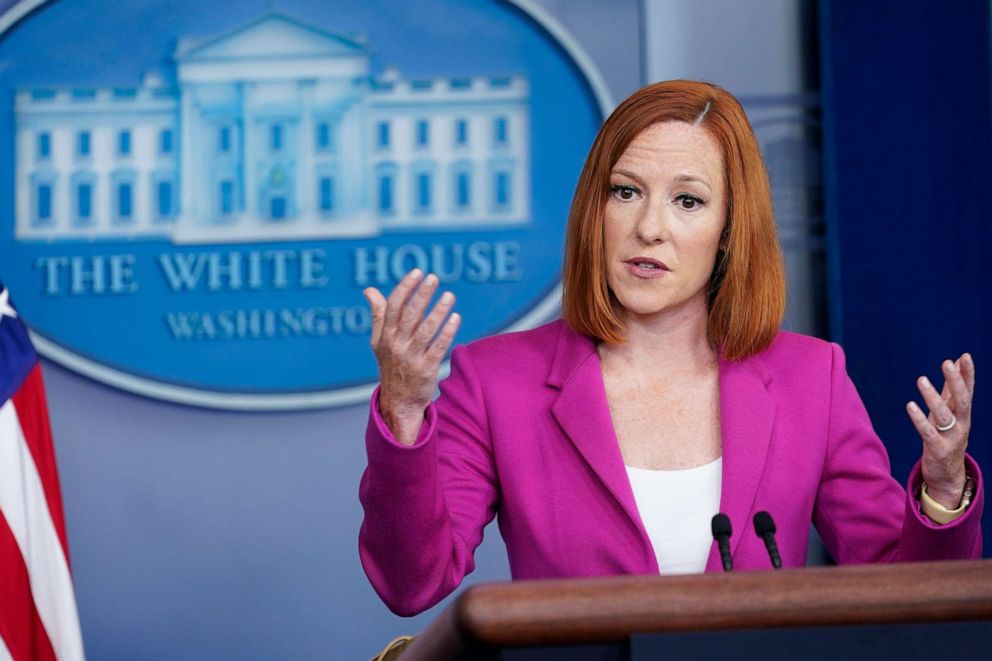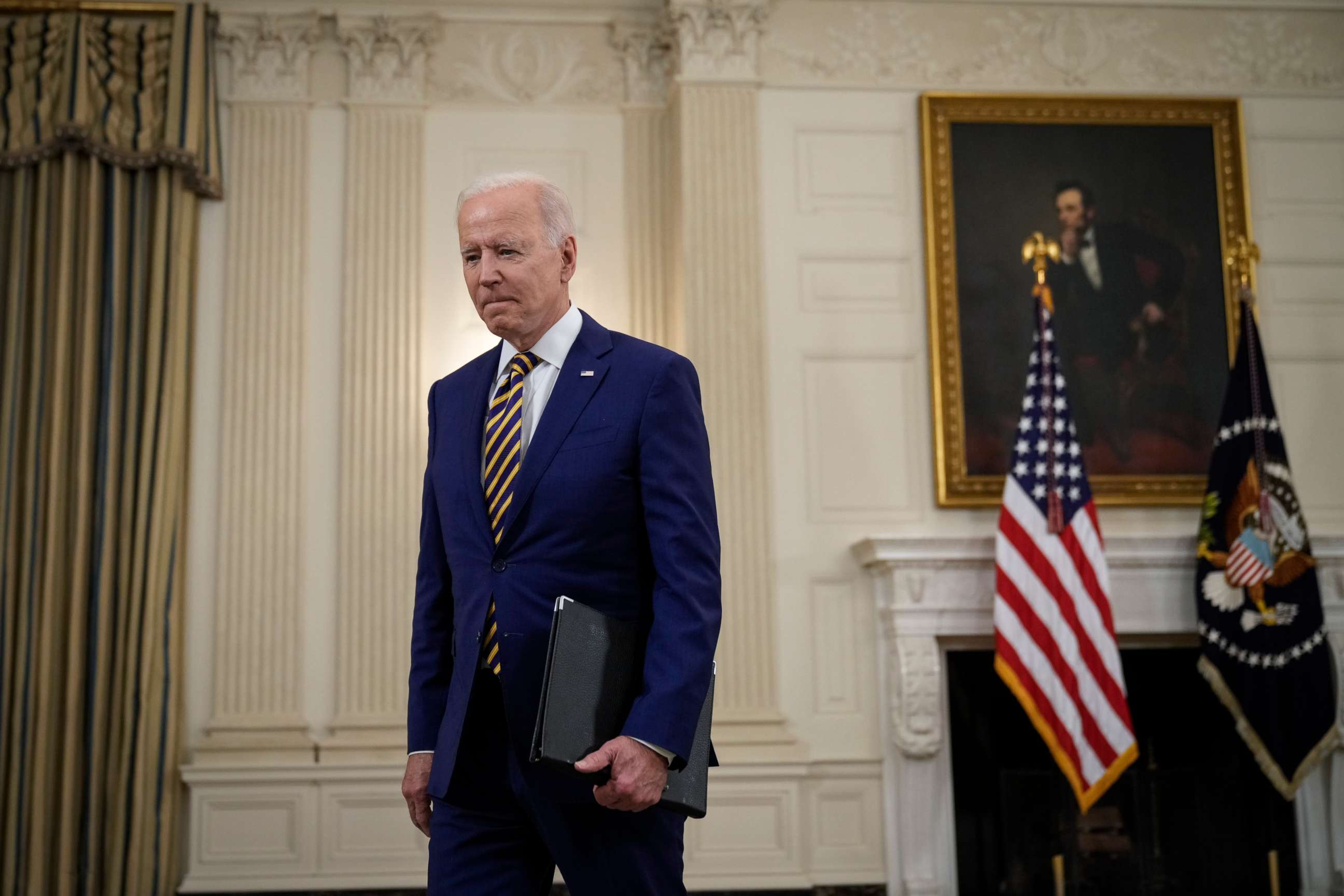White House concedes US won't hit Biden's 70% vaccination goal by July 4
The goal was to vaccinate 70% of all adults 18 and older with at least one shot.
The White House COVID response team announced Tuesday the U.S. will not hit President Joe Biden's goal of getting 70% of all adults ages 18 and older vaccinated with at least one shot by the symbolic July Fourth holiday.
Earlier this month, Biden had called for a national "month of action" -- an "all-America sprint" to reach the goal and a "summer of freedom."
"We can do this," Biden said.
But on Tuesday, White House COVID-19 coordinator Jeff Zients conceded that the current pace of vaccinations wouldn't get the U.S. to the full goal and instead highlighted other vaccination milestones that were not previously public targets. Seventy percent of adults ages 30 and older already have had at least one shot, the White House announced, and by July Fourth, the U.S. will have vaccinated 70% of Americans 27 and older with one shot.
Those achievements, while they signal progress in the fight against COVID, don't meet the initial goal of vaccinating all adults, 18 and older, and bypass the concerning fact that the majority of cases are occurring with those under 30, an age group the COVID team acknowledged they needed to improve outreach efforts with, particularly as cases of the Delta variant rise.
"We want every American in every community to be protected and free from fear of the virus. That's why we'll keep working to vaccinate more Americans across the summer and into the fall ... we are not stopping at 70% and we're not stopping on July Fourth," Zients said at Tuesday's White House COVID response briefing.

Asked later by ABC News Chief White House Correspondent Cecilia Vega what went wrong and why the White House wasn't able to reach the goal that it set, White House press secretary Jen Psaki said that the country has already met the goal of 70% of partially vaccinated adults among those 30-years-and-older, but that it's been harder to vaccinate communities of color, conservative communities and younger populations.
"We don't see it exactly like something went wrong, how we see it is we set a bold, ambitious goal -- something the president has done from the very beginning -- and we are expected to meet that goal. Just a couple of weeks after July 4, and in fact, at this point, as of today, we're going to be already at that point for people who are 30 years of age and older," she said.
As recently as early June, Dr. Anthony Fauci, Biden's chief medical adviser, remained confident that the U.S. would hit Biden's target, which the president announced on May 4.
"We want to, and we are going to hit 70% of the adult population by the Fourth of July," Fauci said on the daytime talk show "Live with Kelly and Ryan" on June 7.

As of Tuesday, 65.4% of adults ages 18 and older had at least one shot. At the current pace of vaccinations, it's unlikely that number will hit 70% by next Sunday — instead, it will take a few extra weeks.
"Where the country has more work to do is particularly with 18 to 26 year olds. The reality is many younger Americans have felt like Covid-19 is not something that impacts them, and they've been less eager to get the shot," Zients said.
It will take a "few extra weeks" to get to 70% of 18-26 year olds, he said.
Approximately 11.8 million more adults need to be vaccinated with their first dose in order to reach 70% of all adults. For the U.S. to reach that by July 4, 12 days away, about 990,000 adults would need to get vaccinated each day. However, as of Tuesday, only about 392,000 adults were getting their first dose each day, on average.
At the current rate, the U.S. would fall about 7.1 million shots short of the 70% goal by July 4, hitting around 67.2% of adults partially vaccinated with at least one dose.
The reluctance among younger adults to get the vaccine, a key barrier to the Biden administration hitting its goal, will remain a challenge beyond Independence Day. Fear of the virus is less for younger people, as the age group accounts for just 0.5% of COVID-19 related deaths. But at the same time, adults 18-29 have also made up the highest number of cases throughout the pandemic, Centers for Disease Control and Prevention data shows, and increasing vaccinations among young adults is vital to stopping the spread of the disease and its variants.
Although cases are trending down among all age groups, the 18- to 24-year-old age group and the 25- to 34-year-old age group currently have the highest weekly case rates per capita out of any age groups. Adults between the ages of 18 and 49 also currently account for the highest percentage of COVID-19 related hospitalizations at about 42%.
White House COVID officials urge vaccines as cases of Delta variant double
The key factor that each COVID official highlighted as a reason to get vaccinated was the Delta variant, which was initially discovered in India and is more severe.
"With the Delta variant now spreading across the country and infecting younger people worldwide, it's more important than ever that they get vaccinated," Zients said.
According to Fauci, the Delta variant has doubled to over 20% in the last two weeks and is expected to continue doubling on the same timeframe. It's spreading mostly among young people, following the same course as in the U.K.
"The Delta variant is currently the greatest threat in the U.S. to our attempt to eliminate COVID-19. Good news: our vaccines are effective against the Delta variant. Conclusion: we have the tools, so let's use them and crush the outbreak," Fauci said.
And CDC Director Rochelle Walensky said that the Delta variant is already nearly half of new infections in much of the Midwest.
"In the last two weeks, the prevalence of cases resulting from the Delta variant has doubled to just over 20%, as Dr. Fauci just showed. This variant represents nearly half of all infections in HHS Regions 7 and 8. This is concerning but expected," she said, referring to Iowa, Kansas, Missouri and Nebraska, which make up HHS Region 7 and Colorado, Montana, North Dakota, South Dakota, Utah and Wyoming, which make up HHS Region 8.
Walensky also went as far as to call every future COVID-19 death preventable, thanks to the vaccines.
"They are nearly 100% effective against severe disease and death, meaning nearly every death due to COVID-19 is particularly tragic because nearly every death, especially among adults, due to COVID-19 is -- at this point -- entirely preventable," she said.
She warned that not getting vaccinated leaves open the risk of the virus mutating to evade the vaccine.
"We know our vaccines work against this variant. However, this variant represents a set of mutations that could lead to future mutations that evade our vaccine. And that's why it's more important than ever to get vaccinated now to stop the chain of infection, the chain of mutations that could lead to a more dangerous variant," Walensky said.
For now, a White House official said the plan is to focus on what has already been achieved, including plummeting cases and deaths. But the concession is a missed mark for the Biden administration, which has frequently been criticized for setting vaccination goals that were not seen as ambitious.
The White House will also tout its own July Fourth celebration plans -- 1,000 first responders and military personnel on the South Lawn to view the traditional fireworks on the National Mall, where thousands more will surely gather.
ABC News' Arielle Mitropoulos contributed to this report.




